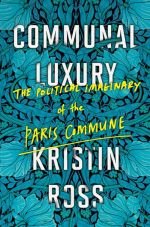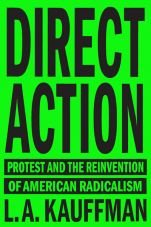Verso books
The Paris Commune was a laboratory of political invention, important simply and above all for, as Marx reminds us, its own ‘working existence.’ Communal Luxury allows readers to revisit the intricate workings of an extraordinary experiment.
Autor*innen: Kristin Ross
Autor*innen: Andreas Malm
As Americans take to the streets in record numbers to resist the presidency of Donald Trump, L.A. Kauffman’s timely, trenchant history of protest offers unique insights into how past movements have won victories in times of crisis and backlash and how they can be most effective today. This deeply researched account, twenty-five years in the making, traces the evolution of disruptive protest since the Sixties to tell a larger story about the reshaping of the American left. Kauffman, a longtime grassroots organizer, examines how movements from ACT UP to Occupy Wall Street to Black Lives Matter have used disruptive tactics to catalyze change despite long odds.
Autor*innen: L. A. Kauffman
Autor*innen: Frédéric Gros
From the 1880s to the 1920s, a profound social awakening among women extended the possibilities of change far beyond the struggle for the vote. Amid the growth of globalized trade, mass production, immigration and urban slums, American and British women broke with custom and prejudice. Taking off corsets, forming free unions, living communally, buying ethically, joining trade unions, doing social work in settlements, these "dreamers of a new day" challenged ideas about sexuality, mothering, housework, the economy and citizenship.
Autor*innen: Sheila Rowbotham
Autor*innen: Cinzia Arruzza; Tithi Bhattacharya; Nancy Fraser
Bearded bomb-throwers, self-indulgent nihilists, dangerous subversives - these characteristic clichés of anarchists in the popular imagination are often reproduced in the cinema. In Film and the Anarchist Imagination, the first comprehensive survey of anarchism in film, Richard Porton deconstructs such stereotypes while offering an authoritative account of films featuring anarchist characters and motifs.
Autor*innen: Richard Porton
During the ferment of the New Left, “Second Wave” feminism emerged as a struggle for women’s liberation and took its place alongside other radical movements that were questioning core features of capitalist society. But feminism’s subsequent immersion in identity politics coincided with a decline in its utopian energies and the rise of neoliberalism. Now, foreseeing a revival in the movement, Fraser argues for a reinvigorated feminist radicalism able to address the global economic crisis.
Autor*innen: Nancy Fraser
In this scintillating, comprehensive study, Ricordeau draws from two decades as an abolitionist activist and scholar of the penal justice system to describe how the criminal justice system hurts women. Considering the position of survivors of violence, criminalized women, and women with criminalized relatives, Ricordeau charts a new path to emancipation without incarceration.
Autor*innen: Gwenola Ricordeau
Autor*innen: Aaron Bastani
In this short, highly readable book, the master of world-systems theory provides a succinct anatomy of capitalism over the past five hundred years. Considering the way capitalism has changed and evolved over the centuries, and what has remained constant, he outlines its chief characteristics. In particular, he looks at the emergence and development of a world market, and of labor; in doing so, he argues that capitalism has brought about immiseration in the Global South. As long as they remain within a framework of world capitalism, Wallerstein concludes, the economic and social problems of developing countries will remain unresolved.
Autor*innen: Immanuel Wallerstein
Autor*innen: Andreas Malm


























